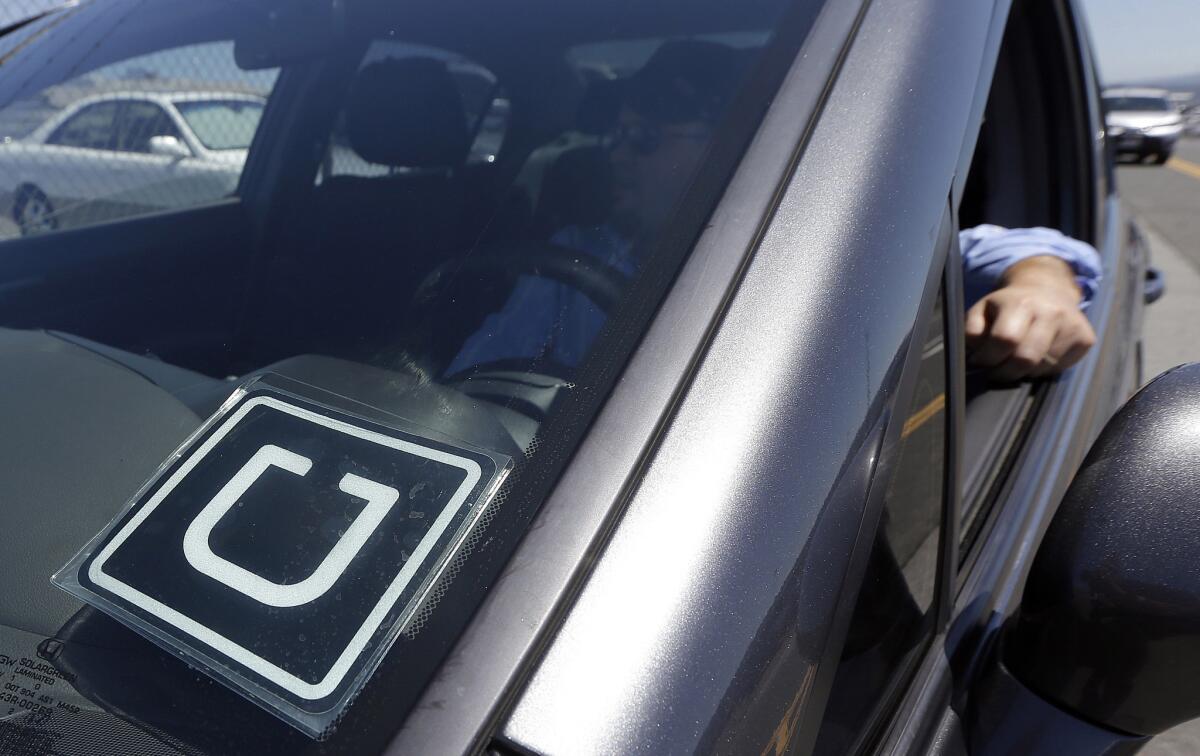Uber will pay up to $100 million to settle suits with drivers seeking employee status

The settlement brings to a close what employment experts believe was the biggest existential threat to Uber. Above, an Uber driver near the San Francisco International Airport last year.
- Share via
reporting from San Francisco — Uber will pay up to $100 million to drivers who had sought to be classified as employees, settling two lawsuits that posed a threat to the company’s on-demand business model, which relies on independent contractors.
The San Francisco ride-hailing company Thursday evening announced it will pay an initial sum of $84 million to settle cases in California and Massachusetts to some 385,000 drivers. Uber, which is valued at $62.5 billion, said it will pay the drivers an additional $16 million if the company’s valuation reaches 1.5 times its current value after it goes public or if it gets bought.
The company also agreed to policy changes that reduce its control over drivers, shifting to be more in line with an independent contractor relationship.
Join the conversation on Facebook >>
The settlement brings to a close what employment experts believe was the biggest existential threat to the fast-growing start-up. Uber built its high valuation on a system that uses independent contractors, enabling the company to avoid covering driver expenses such as gas and mileage, or providing benefits such as health insurance, Social Security, overtime or sick days. Recognizing its drivers as employees would have bitten into its margins -- and potentially slowed its global expansion and raised fares.
Plaintiff attorney Shannon Liss-Riordan brought the lawsuit against Uber and 11 other on-demand companies that use similar models (those companies are not included in the settlement). The case against Uber in California was filed in 2013; drivers in the Massachusetts case filed their suit in 2014.
In addition to the monetary settlement, Uber will institute several changes in the way it disciplines drivers.
The company will no longer be able to deactivate drivers’ accounts at will. Drivers will now receive warnings and have an opportunity to correct any issues before they are cut from the service. The company will also stop deactivating drivers who turn down rides frequently.
Uber will create appeal panels and help drivers form an association so they can contest terminations.
If drivers are unhappy with the result of their appeals, they can bring their claim to an arbitrator at Uber’s expense.
The company will also institute an internal escalation process to handle disputes regarding driver pay.
Finally, Uber will make it clear to riders that tips are not included in Uber’s fares. Drivers will be permitted to solicit tips from passengers -- a policy that competitor Lyft has long offered. Unlike Lyft, Uber will not be adding a tipping feature to its app.
The settlement still needs to be approved by Judge Edward Chen of the District Court of Northern California. An Uber spokeswoman said it will probably be a months-long process.
If approved, the payment will be distributed among drivers in California and Massachusetts who performed at least one trip up until the date of the preliminary settlement approval. Distribution will be based on miles driven while a passenger was in the car. Drivers who logged more than 25,000 miles may receive $8,000 or more, according to Liss-Riordan.
“If we chose not to settle this case, we faced risks,” Liss-Riordan said in a prepared statement. “We faced the risk that a jury in San Francisco (where Uber is everywhere and quite popular) may not side with the drivers over Uber.”
Liss-Riordan acknowledged that some drivers will be disappointed the case did not go to trial. But she noted that the case is only being settled, not decided. This means no court has ruled whether Uber drivers are employees or independent contractors, and future litigation over the same issue remains possible.
“The debate will not end here,” she said.
In a prepared statement on Uber’s website, Chief Executive Travis Kalanick said the majority of Uber drivers prefer to remain independent contractors, which is “why we are so pleased that this settlement recognizes that drivers should remain as independent contractors, not employees,” he said.
Just because Uber has agreed to settle does not mean this particular case is over. Lyft tried to settle a similar class-action lawsuit with drivers this year, but the judge in the case rejected the settlement offer, arguing that the monetary payment was too low. Both sides have gone back to the drawing board.
When taken to trial, employment lawsuits of this kind tend to be all or nothing. By settling, the drivers’ attorney is ensuring her clients will at least receive some compensation.
For Uber, a settlement means the company avoids the risk of losing the lawsuit and being forced to recognize its thousands of drivers as employees -- and putting itself on the hook to pay back wages and benefits.
“As we’ve grown we’ve gotten a lot right — but certainly not everything,” Kalanick said. “But there’s more to do, which is why I’m excited about some other improvements we have planned for the not-too-distant future.”
See the most-read stories this hour >>
Twitter: @traceylien
ALSO
Cuba relents on cruises, allows Carnival to come to island
Volkswagen to take $18.2-billion hit on emissions scandal
Apple’s iBooks, iTunes Movies mysteriously suspended in China; customers want refunds




